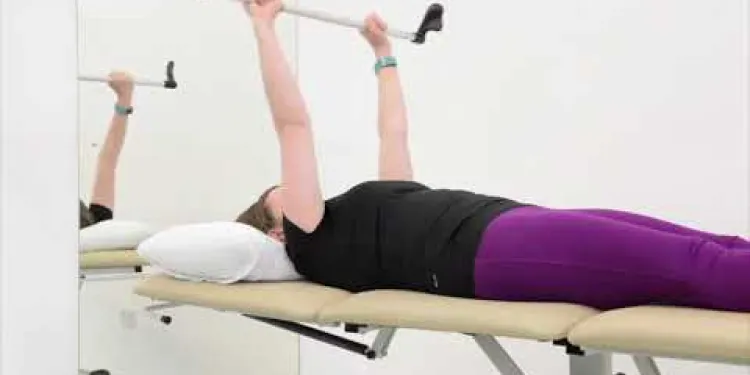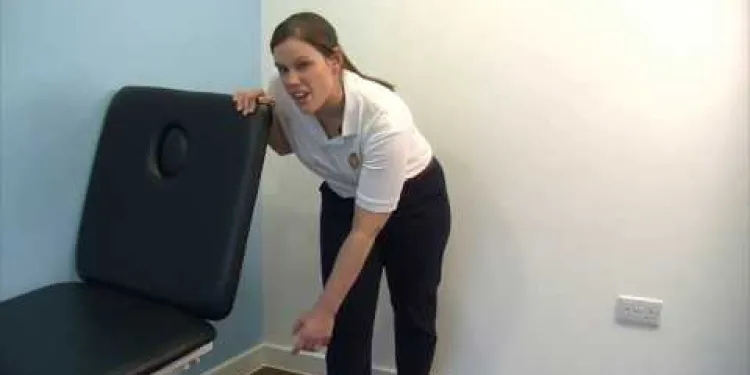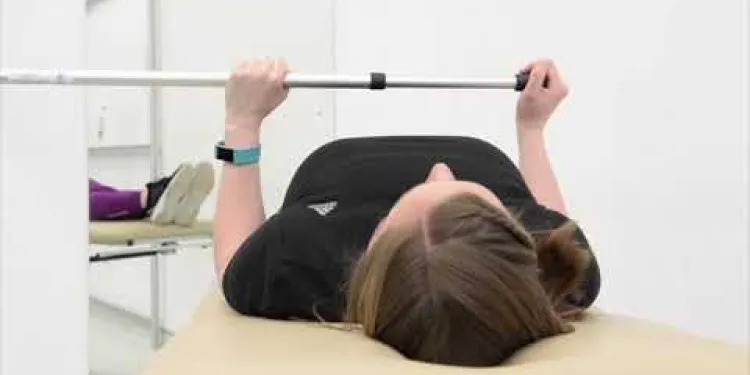Find Help
More Items From Ergsy search
-

Shoulder subacromial shoulder pain
Relevance: 100%
-

Shoulder pain | NHS
Relevance: 96%
-

Shoulder pain | NHS
Relevance: 96%
-

Shoulder pain | NHS
Relevance: 86%
-

Frozen Shoulder Anterior Shoulder Stretch
Relevance: 74%
-

Shoulder Exercises 1
Relevance: 66%
-

Frozen Shoulder Assisted Abduction
Relevance: 66%
-

Frozen shoulder Pendular Exercises
Relevance: 66%
-

Frozen Shoulder Scapular Setting
Relevance: 65%
-

Frozen Shoulder Assisted Flexion
Relevance: 65%
-

DBTH VFC DISLOCATED SHOULDER
Relevance: 65%
-

Frozen Shoulder Lateral Rotation
Relevance: 65%
-

Frozen Shoulder Assisted Lateral Rotation
Relevance: 64%
-

Frozen Shoulder Isometric External Rotation
Relevance: 63%
-

Advice on neck pain and whiplash
Relevance: 47%
-

How do chiropractors treat back pain?
Relevance: 39%
-

Foot Pain
Relevance: 37%
-

Is impetigo painful?
Relevance: 37%
-

Is a facelift painful?
Relevance: 37%
-

Is a mammogram painful?
Relevance: 37%
-

Heel pain | NHS
Relevance: 35%
-

Pilates for back pain: Seated waist twist | NHS
Relevance: 34%
-

Pilates for back pain: Seated waist twist | NHS
Relevance: 34%
-

Are chiropractic treatments painful?
Relevance: 34%
-

What is the role of pain management in treating whiplash?
Relevance: 34%
-

Mechanical Lower Back Pain
Relevance: 33%
-

Will I feel pain during the procedure?
Relevance: 33%
-

Stomach ache and abdominal pain
Relevance: 33%
-

Period pain (dysmenorrhoea) - BSL
Relevance: 33%
-

Is the womb lining test painful?
Relevance: 32%
-

How to treat back pain | NHS
Relevance: 32%
-

How to deal with period pain | NHS
Relevance: 32%
-

How to deal with period pain | NHS
Relevance: 32%
-

How to deal with period pain | NHS
Relevance: 32%
-

Is a womb lining test painful?
Relevance: 32%
-

How to deal with period pain | NHS
Relevance: 32%
-

Greater trochanteric pain syndrome
Relevance: 31%
-

Can I use Ibuprofen for menstrual pain?
Relevance: 31%
-

How do NSAIDs work to reduce pain?
Relevance: 30%
-

MSK Lower Back Pain information video
Relevance: 30%
Shoulder Pain
Introduction
Shoulder pain is a common issue that can affect individuals of all ages. It can be caused by a variety of factors, including injury, strain, and underlying medical conditions. Recognising the symptoms and understanding the possible causes is essential for effective management and treatment. This article aims to provide comprehensive information about shoulder pain for residents in the United Kingdom, in alignment with NHS guidelines.
Common Causes of Shoulder Pain
There are several common causes of shoulder pain, including:
- Rotator Cuff Injuries: These are injuries to the group of muscles and tendons that surround the shoulder joint. They are common in individuals who perform repetitive overhead motions.
- Frozen Shoulder: Also known as adhesive capsulitis, this condition is characterized by stiffness and pain in the shoulder joint. It often worsens over time and limits movement.
- Arthritis: Osteoarthritis and rheumatoid arthritis can affect the shoulder, leading to pain and reduced mobility.
- Bursitis: Inflammation of the small fluid-filled sacs (bursae) that cushion the shoulder joint can cause pain, especially when moving the shoulder.
Symptoms to Watch For
Shoulder pain can present with various symptoms, depending on the underlying cause. Common symptoms include:
- Pain that worsens with movement.
- Reduced range of motion or stiffness in the shoulder.
- Swelling or redness around the shoulder joint.
- Weakness in the shoulder or arm.
- Difficulty in performing everyday tasks.
Treatment and Management
Treatment for shoulder pain often depends on the underlying cause. Some common treatment options include:
- Rest: Avoiding activities that aggravate the shoulder can help reduce pain and inflammation.
- Physiotherapy: Specific exercises can strengthen the shoulder muscles and improve flexibility.
- Medications: Over-the-counter pain relievers such as ibuprofen or paracetamol can help manage pain and inflammation.
- Injections: Corticosteroid injections may be prescribed to reduce severe inflammation.
- Surgery: In cases where non-surgical treatments are ineffective, surgery may be necessary to repair damaged tissues or joints.
When to See a Doctor
It's important to seek medical advice if shoulder pain persists despite home treatment or if you experience severe pain, swelling, or an inability to move your shoulder. Your GP can assess your symptoms, conduct necessary tests, and recommend appropriate treatment. Early intervention can prevent worsening of the condition and improve recovery outcomes.
For more information on shoulder pain, visit the NHS website.
Understanding Shoulder Pain: A Guide by the NHS
Shoulder pain is a common condition that affects many people in the United Kingdom. It can arise from a variety of causes and may impact your daily life. Understanding shoulder pain and knowing when to seek medical advice is crucial for effective management and recovery.
Causes of Shoulder Pain
Shoulder pain can be caused by a variety of factors. Common causes include rotator cuff injuries, bursitis, and arthritis. Overuse injuries from repetitive activities can also result in shoulder discomfort. In some cases, sports injuries or accidents may lead to dislocations or fractures that cause significant pain.
Symptoms to Watch For
Symptoms of shoulder pain can range from a dull ache to sharp, stabbing pain. You may experience stiffness, limited range of motion, or swelling. Some individuals report weakness in the shoulder, making it challenging to lift objects. If you experience severe or persistent symptoms, consulting with a healthcare professional is advisable.
Treatment and Management
The treatment of shoulder pain often depends on its underlying cause. Initial management may include rest, ice application, and over-the-counter pain relief. Physiotherapy is frequently recommended to strengthen shoulder muscles and improve flexibility. In more severe cases, medical interventions such as injections or surgery might be necessary.
When to Seek Help
If shoulder pain persists for more than a few weeks, affects your ability to perform daily activities, or is accompanied by symptoms such as numbness or severe swelling, it's important to seek medical assistance. The NHS provides resources and support through its healthcare providers to assess and treat shoulder conditions effectively.
In conclusion, understanding the cause and treatment options for shoulder pain can help you manage the condition effectively. Staying informed and seeking appropriate care when needed can significantly enhance your quality of life.
Shoulder Pain
Introduction
Shoulder pain is when your shoulder hurts. It can happen to anyone. Lots of things can cause it, like getting hurt or being sick. Knowing why it hurts can help you feel better. This guide will help you understand shoulder pain and how to make it better.
Common Causes of Shoulder Pain
Here are some common reasons why shoulders hurt:
- Rotator Cuff Injuries: This happens when the muscles and tendons in your shoulder get hurt. It often occurs if you do a lot of work with your arms over your head.
- Frozen Shoulder: This is when your shoulder gets very stiff and it hurts a lot. It can make it hard to move your shoulder.
- Arthritis: This is when your joints get swollen and hurt, making it hard to move. It can happen in your shoulders, too.
- Bursitis: This is when small sacs in your shoulder that help it move smoothly get swollen. It often hurts to move your shoulder when this happens.
Symptoms to Watch For
Shoulder pain can feel different depending on what's wrong. Look out for:
- Pain that gets worse when you move your shoulder.
- Finding it hard to move your shoulder or it feels stiff.
- Your shoulder looks puffy or red.
- Your arm or shoulder feels weak.
- Struggling to do daily tasks because of shoulder pain.
Treatment and Management
How you treat shoulder pain depends on what's causing it. Here are some ways to help:
- Rest: Stop doing things that make it worse. Resting can help it heal.
- Physiotherapy: Doing special exercises can make your shoulder stronger and move better.
- Medications: Taking medicine like ibuprofen or paracetamol can help with pain.
- Injections: A doctor might give you an injection to help with swelling and pain.
- Surgery: If other treatments don’t work, surgery might help fix your shoulder.
When to See a Doctor
You should see a doctor if your shoulder pain doesn't go away, if it’s very bad, or if you can't move your shoulder. The doctor can check what's wrong and suggest how to make it better. Seeing a doctor soon can help you get better faster.
For more details on shoulder pain, visit the NHS website.
Understanding Shoulder Pain: A Guide by the NHS
Shoulder pain means your shoulder hurts. Many people in the UK have shoulder pain. It can happen for many reasons and may stop you from doing normal things. Knowing about shoulder pain and when to get help from a doctor is important for feeling better.
Causes of Shoulder Pain
Shoulder pain can start for different reasons. Common reasons are injuries to the rotator cuff, bursitis, and arthritis. Doing the same movement too much can also hurt your shoulder. Sometimes, playing sports or having an accident can make bones move out of place or break, causing a lot of pain.
Symptoms to Watch For
Shoulder pain can feel like a dull ache or a sharp pinch. You might feel stiff, or it might be hard to move your shoulder. There may be swelling. Some people feel their shoulder is weak, making it hard to lift things. If the pain is very bad or does not go away, see a doctor.
Treatment and Management
How you treat shoulder pain depends on why it hurts. First, you might need to rest, put ice on it, and take medicine you can buy at the store to help with pain. A physiotherapist can help make your shoulder stronger and more flexible. If the pain is really bad, sometimes you might need medicine from a doctor or even surgery.
When to Seek Help
If the pain lasts more than a few weeks, makes it hard to do daily activities, or comes with numbness or lots of swelling, see a doctor. The NHS can help you find doctors and give support for shoulder problems.
In conclusion, knowing what causes shoulder pain and how to treat it can help you feel better. Staying informed and going to the doctor when you need to can help you live a better life.
Frequently Asked Questions
What are common causes of shoulder pain?
When should I see a doctor for shoulder pain?
How can I relieve shoulder pain at home?
Is physiotherapy helpful for shoulder pain?
Can poor posture cause shoulder pain?
Are there any exercises to prevent shoulder pain?
Can stress cause shoulder pain?
Is shoulder pain related to heart problems?
What is 'frozen shoulder'?
Can sleeping position affect shoulder pain?
Is surgery commonly needed for shoulder pain?
What is bursitis in the shoulder?
What kind of doctor should I consult for shoulder pain?
Can overuse of shoulder muscles lead to pain?
How long does shoulder pain typically last?
What makes shoulders hurt?
This is a guide to help you understand something better. Let's break it down into simple words. Here's what you need to know:
What is this about?
We are talking about a topic that might be a bit tricky to understand. But don't worry! We will make it simple.
Steps to Understand:
- Read one part at a time.
- Ask questions if you don't understand. It's okay to ask for help!
- Take breaks if you feel tired. It's important to rest.
- Use a ruler or your finger to help follow the line. This makes reading easier.
Tools that can help:
- Audio Books: You can listen instead of reading.
- Text-to-Speech Apps: These apps read the text out loud to you.
- Highlighting: Use a marker to highlight important parts.
- Notes: Write down important words to remember them better.
Remember, learning is a journey. Take your time and keep trying your best!
When should I go to the doctor for shoulder pain?
If your shoulder hurts, see a doctor when:
- The pain is very strong
- You cannot move your shoulder
- Your shoulder is swollen or bruised
- The pain does not go away after a few days
Tip: Ask someone you trust to help you talk to the doctor. Write down your pain on paper.
How can I make my shoulder feel better at home?
Can physio help if my shoulder hurts?
How to Understand Solar Power
Solar power uses the sun to make electricity. This is how it works:
1. The sun shines on solar panels.
2. The panels turn sunlight into electricity.
Why Use Solar Power?
Solar power is good because:
- It does not make the air dirty.
- It will not run out.
Helpful Tips
Here are some tips to help you learn more:
- Use pictures and videos to see how solar power works.
- Ask someone to explain things if you do not understand.
Can sitting or standing badly hurt your shoulders?
If you sit or stand in a bad way, it can make your shoulders hurt.
Here are some tips to help:
- Sit up straight with your back against the chair.
- Keep your feet flat on the floor.
- Take breaks to move around every hour.
If you feel pain, ask an adult or a doctor for help.
This is a simple guide to make reading easy:
1. Use Short Words: Try to use words that are easy to understand.
2. Make Sentences Short: Keep sentences short and to the point.
3. Use Pictures: A picture can help explain what you mean.
4. Use Big Text: Big text can be easier to read.
5. Use Clear Space: Leave space between lines to make it less crowded.
6. Use Helpful Tools: Try using reading tools like audiobooks or reading apps to help if you find it hard to read.
Reading can be fun! Try these tips to make it easier.
Can you do exercises to stop shoulder pain?
Yes! There are some easy exercises you can do to help your shoulders stay healthy and strong.
Try to do gentle stretches and simple arm movements. You can also use tools like stretchy bands or a small ball.
It's good to do these exercises a few times a week. This can help keep your shoulders from hurting.
Hello! Let’s make this text super easy to understand.
What is the Topic?
This answer is about making reading easier.
Simple Words
Using simple words helps everyone understand better. Use short words and short sentences.
Break It Down
Big ideas can be hard. Let’s make them smaller. Explain one idea at a time.
Helpful Tools
Sometimes, it’s nice to have help. Here are some tools and tricks:
- Pictures: Pictures help us see what words mean.
- Read Aloud: You can listen while you read. This helps a lot.
- Highlighting: Use colors to show important parts.
- Dictionaries: Easy online dictionaries can explain words.
Take Breaks
If it gets too hard, stop and rest. You can try again later. That’s okay!
Ask for Help
If you are stuck, ask someone. It’s okay to need help.
Remember, reading can be fun and easy with practice and support!
Can stress make your shoulder hurt?
Can shoulder pain be a sign of heart problems?
Sometimes, pain in your shoulder might be a sign that your heart is not well. This can happen if you have a heart attack.
If you have shoulder pain and also feel other signs like chest pain, feeling sick, or trouble breathing, tell an adult or a doctor.
To help understand more, you can use pictures and talk to someone who knows about health.
What is Frozen Shoulder?
Frozen shoulder is when your shoulder gets stiff and hurts. It can be hard to move your arm. This can last for a long time.
Ways to help:
- Talk to a doctor.
- Do special exercises.
- Use heat packs on your shoulder.
Can the way you sleep hurt your shoulders?
Sometimes, how you lie in bed can make your shoulders hurt. Sleeping on your side might push on your shoulder. Try using a soft pillow to help. Lying on your back can be better for your shoulders.
Here are some things you can do:
- Use a comfy pillow.
- Try to sleep on your back.
- Ask someone to help if you need it.
- Talk to a doctor if your shoulder keeps hurting.
If you need help reading, you can try using audiobooks or ask someone to read with you.
Do people often need surgery to fix shoulder pain?
Shoulder pain is when your shoulder hurts. Sometimes, when your shoulder hurts a lot, doctors might do surgery. This is when doctors fix your shoulder with an operation. But most of the time, surgery is not needed.
If your shoulder hurts, you can try some easy things first. Here are some helpful ideas:
- Rest: Give your shoulder a break. Don't use it too much.
- Ice: Put something cold on your shoulder. This can help with pain.
- Exercises: Doctors or therapists can show you special moves to help your shoulder feel better.
- Talk to a doctor: A doctor can help you understand what's wrong and what to do.
Before thinking about surgery, it's good to try these simple steps first.
What is bursitis in the shoulder?
Bursitis in the shoulder is when a small sack inside your shoulder gets swollen. This sack helps your shoulder move smoothly. When it gets swollen, it can hurt and make moving your shoulder hard.
If your shoulder hurts or feels stiff, you can try to:
- Rest your shoulder and not use it too much
- Put ice on it to help with swelling
- Ask a doctor for help if it still hurts a lot
If reading is hard, you can:
- Ask a friend or family member to read the text aloud
- Use audiobooks or listening apps
If you want to understand this answer more easily, here is a simpler way to read it. Using plain and clear words can help. Here are some tips that might be useful:
- Read slowly and take your time. You don’t have to rush.
- Break down big words into smaller ones. This can make them easier to understand.
- If you find a word that is hard, ask someone to explain it to you or use a dictionary.
- Use pictures or drawings to help you think about ideas.
Here is the information written in a simpler way:
Title Here
This answer is about a topic. It has important information to help you understand. If some parts are still hard to understand, remember to take breaks and try again.
It can also help to talk to someone else about what you read. They can share their ideas, and you can learn together.
Here are more ideas that might help:
- Use your finger to follow each word as you read.
- Listen to someone read it out loud.
- Practice reading every day to get better.
Remember, it is okay to ask for help when you need it. You are doing great!
Which doctor should I see for shoulder pain?
If your shoulder hurts, you might need to see a doctor. Here are some doctors who can help:
- Family Doctor: This doctor can check your shoulder and suggest what to do next.
- Orthopedic Doctor: This doctor is special for bones and joints. They know a lot about shoulders.
- Physical Therapist: This person can show you exercises to make your shoulder feel better.
- Chiropractor: This person uses hands-on techniques to help with pain.
Tools and Tips:
- Ask for Help: If you find reading or understanding hard, ask someone you trust to explain.
- Use Pictures: Look for pictures or videos about shoulder pain to learn more.
Here are some tips to help you:
- Take it slow. Read one bit at a time.
- Use a finger or a pen to follow the words.
- Try reading with a friend or adult.
- If a word is hard, sound it out slowly.
- Use audiobooks to hear the story.
- Practice by reading every day.
- Take breaks if reading feels too hard.
Remember, reading takes practice, and it's okay to ask for help!
Can using shoulder muscles too much cause pain?
If you use your shoulder muscles a lot, they can start to hurt. It's important to rest your shoulders.
- Take breaks when doing exercises or activities.
- Stretch your shoulders gently.
- Ask an adult to help you if your shoulder hurts a lot.
Listening to your body and taking care of it can help keep your shoulders healthy.
How long does shoulder pain usually last?
Useful Links
Have you found an error, or do you have a link or some information you would like to share? Please let us know using the form below.
-->
This website offers general information and is not a substitute for professional advice.
Always seek guidance from qualified professionals.
If you have any medical concerns or need urgent help, contact a healthcare professional or emergency services immediately.
Some of this content was generated with AI assistance. We’ve done our best to keep it accurate, helpful, and human-friendly.
- Ergsy carfully checks the information in the videos we provide here.
- Videos shown by Youtube after a video has completed, have NOT been reviewed by ERGSY.
- To view, click the arrow in centre of video.
- Most of the videos you find here will have subtitles and/or closed captions available.
- You may need to turn these on, and choose your preferred language.
- Go to the video you'd like to watch.
- If closed captions (CC) are available, settings will be visible on the bottom right of the video player.
- To turn on Captions, click settings .
- To turn off Captions, click settings again.
More Items From Ergsy search
-

Shoulder subacromial shoulder pain
Relevance: 100%
-

Shoulder pain | NHS
Relevance: 96%
-

Shoulder pain | NHS
Relevance: 96%
-

Shoulder pain | NHS
Relevance: 86%
-

Frozen Shoulder Anterior Shoulder Stretch
Relevance: 74%
-

Shoulder Exercises 1
Relevance: 66%
-

Frozen Shoulder Assisted Abduction
Relevance: 66%
-

Frozen shoulder Pendular Exercises
Relevance: 66%
-

Frozen Shoulder Scapular Setting
Relevance: 65%
-

Frozen Shoulder Assisted Flexion
Relevance: 65%
-

DBTH VFC DISLOCATED SHOULDER
Relevance: 65%
-

Frozen Shoulder Lateral Rotation
Relevance: 65%
-

Frozen Shoulder Assisted Lateral Rotation
Relevance: 64%
-

Frozen Shoulder Isometric External Rotation
Relevance: 63%
-

Advice on neck pain and whiplash
Relevance: 47%
-

How do chiropractors treat back pain?
Relevance: 39%
-

Foot Pain
Relevance: 37%
-

Is impetigo painful?
Relevance: 37%
-

Is a facelift painful?
Relevance: 37%
-

Is a mammogram painful?
Relevance: 37%
-

Heel pain | NHS
Relevance: 35%
-

Pilates for back pain: Seated waist twist | NHS
Relevance: 34%
-

Pilates for back pain: Seated waist twist | NHS
Relevance: 34%
-

Are chiropractic treatments painful?
Relevance: 34%
-

What is the role of pain management in treating whiplash?
Relevance: 34%
-

Mechanical Lower Back Pain
Relevance: 33%
-

Will I feel pain during the procedure?
Relevance: 33%
-

Stomach ache and abdominal pain
Relevance: 33%
-

Period pain (dysmenorrhoea) - BSL
Relevance: 33%
-

Is the womb lining test painful?
Relevance: 32%
-

How to treat back pain | NHS
Relevance: 32%
-

How to deal with period pain | NHS
Relevance: 32%
-

How to deal with period pain | NHS
Relevance: 32%
-

How to deal with period pain | NHS
Relevance: 32%
-

Is a womb lining test painful?
Relevance: 32%
-

How to deal with period pain | NHS
Relevance: 32%
-

Greater trochanteric pain syndrome
Relevance: 31%
-

Can I use Ibuprofen for menstrual pain?
Relevance: 31%
-

How do NSAIDs work to reduce pain?
Relevance: 30%
-

MSK Lower Back Pain information video
Relevance: 30%


